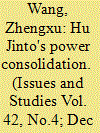|
|
|
Sort Order |
|
|
|
Items / Page
|
|
|
|
|
|
|
| Srl | Item |
| 1 |
ID:
112845


|
|
|
|
|
| Publication |
2012.
|
| Summary/Abstract |
Shi Tianjian's whole academic career was devoted to the understanding of citizens' values and behaviours in China. With exceptional competence in survey design and analysis, he aimed at explaining how citizens perceive and interact with politics within the Chinese cultural and institutional context. His studies on the Chinese case are at the same time closely integrated with the debates about political culture and institutions. Throughout his career, his work closely engaged concepts and paradigms in comparative political studies as well as general social science. That way, his work provided and continues to provide ample opportunities for scholarly debates and further advancement.
|
|
|
|
|
|
|
|
|
|
|
|
|
|
|
|
| 2 |
ID:
074900


|
|
|
|
|
| Publication |
2006.
|
| Summary/Abstract |
Using survey data to analyse the strength of the Chinese regime, it is argued that economic development has generated substantial public satisfaction. The public also recognises that the Chinese Communist Party is reforming the Government. The public's satisfaction with Government performance in both the economic and political arenas translates into a high level of public trust in the regime. At the same time, the Party effectively halts any open challenges to its political power. It will therefore likely hold on to power for some time to come. Western nations can assist democracy in China by encouraging the democratic and curbing the authoritarian elements within the regime.
|
|
|
|
|
|
|
|
|
|
|
|
|
|
|
|
| 3 |
ID:
076677


|
|
|
| 4 |
ID:
121211


|
|
|
|
|
| Publication |
2013.
|
| Summary/Abstract |
In the last few years, the demands of homeowners in Chinese cities have gradually shifted away from economic rights and towards political ones. At the same time, alliances across different communities have emerged and vigorous attempts to form citywide solidarities have been made. In this process, a group of dedicated leaders has emerged, contributing greatly to the escalation of collective actions. This article focuses on a core group of Beijing activists behind the organization, expression and participation of homeowners' associations. Relying on data collected from interviews, documents and participatory observations conducted over a period of more than two years, we were able to pin down the socio-economic, social and political backgrounds of these leaders, as well as their attitudes, objectives and repertoire of actions. We describe leaders as falling into a two-by-two typology that is defined by a motivation dimension and an activeness dimension. Depending on his or her goals and approaches, a protest leader can be variously viewed as a political actionist, a frustrated changer, a double harvester or a tiger rider. These different types of leaders are all in one way or another promoting socio-political changes in China.
|
|
|
|
|
|
|
|
|
|
|
|
|
|
|
|
| 5 |
ID:
137459


|
|
|
|
|
| Summary/Abstract |
Since the late 1990s, a large number of electoral reforms have occurred in China's towns and townships across the country. While scattered cases of direct election of township heads happened in the early years, recent cases have acquired very diverse and complicated institutional arrangements. Three ideal types of innovation have emerged that range from competitive selection to direct election. The actual changes to electing or selecting a township leader can be best measured in (1) the degree to which public participation is expanded; and (2) the degree of competition introduced between candidates. In the late 1990s, during the first wave of these innovations, the enterprising cadres in the regime's middle elite, mostly county and city officials, often played a critical ‘crafting’ role, as they responded to local crises in governance or competed for faster promotion. In recent years, amelioration in local governance means crises have become less pressing, while the widespread implementation of reforms means that contained forms of participation and competition are likely to become the new status quo of township institutions.
|
|
|
|
|
|
|
|
|
|
|
|
|
|
|
|
| 6 |
ID:
080493


|
|
|
|
|
| Publication |
2007.
|
| Summary/Abstract |
It is clear that public support for democracy is high in China. Public opinion surveys show that more than 90% of Chinese citizens believe that having a democracy is good. But the majority is not yet ready for a major effort towards democratization because they still see economic growth and social stability as more important than freedom of speech, political participation, and other democratic rights. However, more and more people are growing up with the belief that political rights and freedom supersede economic wellbeing or other materialist goals. In 15-20 years, Chinese society will be dominated by people with such beliefs. We can be cautiously optimistic about the prospects for democratic change in China
|
|
|
|
|
|
|
|
|
|
|
|
|
|
|
|
|
|
|
|
|